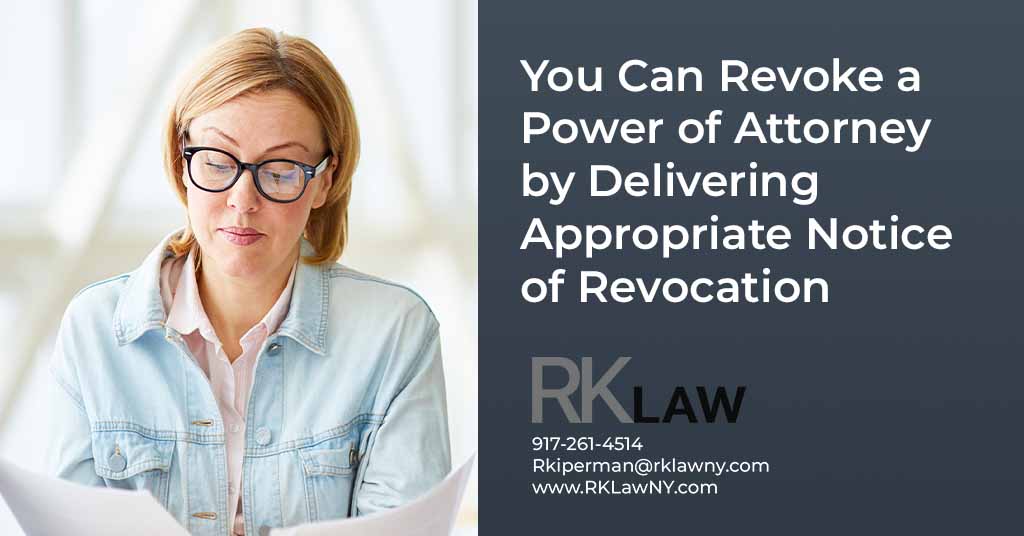Why would you Want to Revoke a Power of Attorney?
There are a number of ways and reasons to revoke a power of attorney. Pursuant to General Obligations Law 5-1501(2)(O), A Power of Attorney is a document which designates someone, called an agent, to manage the principal’s financial affairs on their behalf. While the agent can act for the principal while they are still capable, most often the main purpose is for the agent to act at a time when the principal is no longer able to manage their affairs on their own.
There are times when you may change your mind about who your agents should be. Perhaps a new significant other may come into your life and you may want that person to have the authority you previously gave to someone else. Perhaps your agent may no longer be able or willing to act on your behalf, necessitating a change. Going a step further, you may subsequently find out that the person you have chosen is not as trustworthy as you thought and you have doubts about their ability to manage your finances and may have misused the power of attorney. In any of these cases, the answer is to revoke a power of attorney that you previously gave.
When do you Revoke?
A Power of Attorney can be revoked at any time as long as you have the mental capacity to do so. If you no longer wish to have your agent act on your behalf you can revoke your Power of Attorney.
If a person does not have mental capacity to revoke a Power of Attorney, and there has been a breach of fiduciary duty, or the previous Power of Attorney was executed at a time when the principal lacked capacity, then you can commence a guardianship proceeding, and, in that proceeding, ask that the Power of Attorney be revoked or set aside pursuant to MHL 81.29(d)
How do you Revoke a Power of Attorney?
New York General Obligations Law (GOL) 5-1511(3) sets forth the procedures for terminating or revoking a power of attorney. GOL 5-1511(3), provides, in relevant part, as follows:
A principal may revoke a power of attorney:
(a) in accordance with the terms of the power of attorney; or
(b) by delivering a revocation of the power of attorney to the agent in person
Or
by sending a signed and dated revocation by mail, courier, electronic transmission or facsimile to the agent’s last known address.
The agent must comply with the principal’s revocation notwithstanding the actual or perceived incapacity of the principal unless the principal is subject to a guardianship under article eighty-one of the mental hygiene law.
In order to Revoke your Power of Attorney best practice is to take the following steps:
- Execute a document called a Revocation setting forth the date of the Power of Attorney, the agent name and that you are booking such document
- Notify the agent of the revocation
- Provide the agent with a copy of the revocation. I typically advise clients to send the notice of revocation by certified mail or mail that can be tracked so that you can have proof of delivery.
In addition to giving notice of the revocation to the agent, notice should also be provided to any financial institution that has been provided with a copy of the Power of Attorney. This is because NY GOL 5-1511(5) provides, as follows:
Termination of an agent’s authority or of the power of attorney is not effective as to any third party who has not received actual notice of the termination and acts in good faith under the power of attorney…A financial institution is deemed to have actual notice after it has had a reasonable opportunity to act on a written notice of the revocation or termination following receipt of the same at its office where an account is located.
Translation: a bank that does not know you have revoked your power of attorney can still act on it. The only way a bank can know if you have revoked the power of attorney is after they receive written notice of the revocation. Therefore, send notification to the bank
Finally, if you recorded your Power of Attorney, for example, with a title company, you will need to record the Revocation. Indeed, NY GOL 5-1511(4) directs the principal to record the revocation of the power of attorney.
What if you Don’t Revoke it?
If you do not revoke your Power of Attorney, it remains in effect until your death. Once a person dies, the Power of Attorney ceases. If you cannot revoke the Power of Attorney, but you know that somebody may be abusing or misusing the power of attorney or otherwise breaching their fiduciary duty, then you may need to commence a guardianship proceeding.
Should I Do Anything After I have Revoked?
Engage in prudent estate planning to properly manage your affairs. We can help you identify the appropriate estate planning documents you may need and the right agents to serve your purposes. Contact us today for more information.
For more information, please contact NYC Probate Litigation, Guardianship, NYC Probate and Estate Planning attorney Regina Kiperman:
Phone: 917-261-4514
Fax: 929-556-2089
Email: rkiperman@rklawny.com
Or visit her at:
40 Wall Street
Suite 2508
New York, NY 10005
Visit Regina on LinkedIn
Visit Regina on Facebook
This page is made available by the lawyer for educational purposes only as well as to give you general information and a general understanding of the law, not to provide specific legal advice. By using this site you understand that there is no attorney client relationship between you and the lawyer. The post should not be used as a substitute for competent legal advice from a licensed professional attorney in your state. ATTORNEY ADVERTISING.
